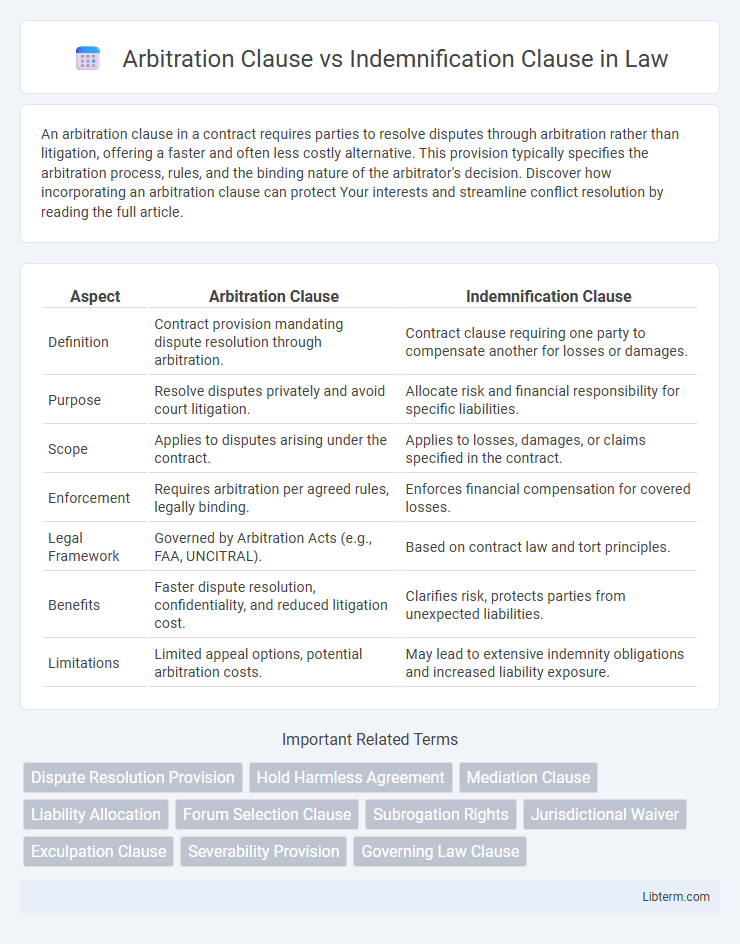An arbitration clause in a contract requires parties to resolve disputes through arbitration rather than litigation, offering a faster and often less costly alternative. This provision typically specifies the arbitration process, rules, and the binding nature of the arbitrator's decision. Discover how incorporating an arbitration clause can protect Your interests and streamline conflict resolution by reading the full article.
Table of Comparison
| Aspect | Arbitration Clause | Indemnification Clause |
|---|---|---|
| Definition | Contract provision mandating dispute resolution through arbitration. | Contract clause requiring one party to compensate another for losses or damages. |
| Purpose | Resolve disputes privately and avoid court litigation. | Allocate risk and financial responsibility for specific liabilities. |
| Scope | Applies to disputes arising under the contract. | Applies to losses, damages, or claims specified in the contract. |
| Enforcement | Requires arbitration per agreed rules, legally binding. | Enforces financial compensation for covered losses. |
| Legal Framework | Governed by Arbitration Acts (e.g., FAA, UNCITRAL). | Based on contract law and tort principles. |
| Benefits | Faster dispute resolution, confidentiality, and reduced litigation cost. | Clarifies risk, protects parties from unexpected liabilities. |
| Limitations | Limited appeal options, potential arbitration costs. | May lead to extensive indemnity obligations and increased liability exposure. |
Introduction to Arbitration and Indemnification Clauses
Arbitration clauses mandate resolving disputes through arbitration rather than court litigation, promoting faster and confidential conflict resolution. Indemnification clauses assign financial responsibility, where one party agrees to compensate the other for specific losses or damages incurred. Both clauses play a crucial role in risk management and contractual clarity within business agreements.
Defining Arbitration Clauses
Arbitration clauses are contractual provisions that require parties to resolve disputes through arbitration rather than litigation, offering a private, binding decision by an impartial arbitrator. These clauses specify the rules, location, and procedures for arbitration, ensuring an efficient alternative to court proceedings. Unlike indemnification clauses that focus on risk allocation and compensation, arbitration clauses emphasize the method and forum for dispute resolution.
Understanding Indemnification Clauses
Indemnification clauses allocate risk by requiring one party to compensate the other for specified losses, damages, or liabilities arising from contract-related events. These clauses often define the scope of indemnity, including the types of claims covered, such as third-party claims, and outline procedures for notification and defense. Understanding indemnification provisions is critical for managing potential financial exposure and ensuring clear responsibility for legal or financial consequences within agreements.
Key Differences Between Arbitration and Indemnification Clauses
Arbitration clauses require parties to resolve disputes through a binding arbitration process instead of litigation, emphasizing conflict resolution methods. Indemnification clauses focus on the allocation of financial responsibility, ensuring one party compensates the other for specified losses or damages. The key difference lies in arbitration addressing how disputes are settled, while indemnification governs the compensation for harm or liability arising from contractual relations.
Legal Implications of Arbitration Clauses
Arbitration clauses establish a private dispute resolution mechanism that limits access to court litigation, potentially reducing legal costs and time for parties involved. They often mandate confidentiality and finality in decisions, which can restrict appellate review and impact legal precedents. Understanding the enforceability and scope of arbitration clauses is crucial, as courts may vary in upholding these provisions depending on jurisdiction and the specific language used.
Legal Implications of Indemnification Clauses
Indemnification clauses assign financial responsibility for losses or damages between contracting parties, significantly impacting risk allocation and potential liability exposure. These clauses often require careful legal scrutiny to determine enforceability, scope, and limitations, as courts may interpret broad indemnity provisions strictly or impose statutory restrictions. Understanding the interplay between arbitration clauses and indemnification clauses is essential to navigating dispute resolution mechanisms and ensuring indemnity obligations are effectively enforceable within arbitration settings.
Scenarios Where Arbitration Clauses Are Essential
Arbitration clauses are essential in commercial contracts where parties seek efficient, confidential dispute resolution without resorting to lengthy litigation, particularly in industries like construction, technology, and international trade. These clauses prevent jurisdictional conflicts by specifying arbitration as the exclusive method for resolving disputes, thus reducing legal expenses and ensuring faster decisions. In contrast, indemnification clauses focus on allocating risk and financial responsibility for damages, but do not address the mechanism for dispute resolution.
Situations Best Suited for Indemnification Clauses
Indemnification clauses are best suited for situations involving potential financial losses or damages caused by one party's negligence, misconduct, or breach of contract, providing a clear mechanism for compensation. These clauses are crucial in industries with high liability risks, such as construction, manufacturing, and healthcare, where unpredictable expenses may arise from third-party claims. Unlike arbitration clauses, which resolve disputes, indemnification clauses directly address the allocation of financial responsibility before disputes escalate.
Drafting Considerations: Arbitration vs Indemnification
When drafting an arbitration clause, it is crucial to clearly define the scope of disputes subject to arbitration, specify the arbitration rules, and designate the venue and language to avoid jurisdictional conflicts. In contrast, an indemnification clause requires precise language outlining the scope of liabilities covered, including the parties' obligations to compensate for losses, damages, or third-party claims, while clarifying any limitations or exclusions of indemnity. Careful attention to enforceability, governing law, and potential overlaps between arbitration and indemnification provisions ensures effective risk management and dispute resolution.
Choosing the Right Clause for Your Contract
Choosing the right clause for your contract depends on the specific risk management and dispute resolution needs; an arbitration clause mandates resolving disputes through arbitration, providing a private and often faster alternative to court litigation. An indemnification clause shifts financial responsibility, protecting a party from losses or damages caused by another party's actions. Carefully assessing your contract's purpose and potential liabilities ensures the appropriate clause mitigates risks effectively and supports the intended legal protections.
Arbitration Clause Infographic

 libterm.com
libterm.com